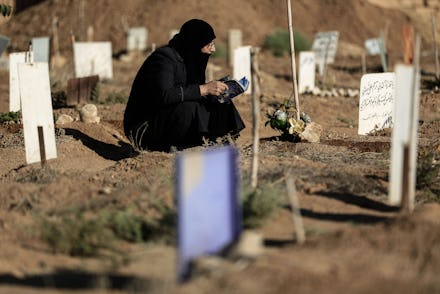Before the sarin gas attack, here's how Americans felt about Syrian intervention

It was early in the morning when the bombs came raining down.
Children, some of whom had been asleep in their beds moments earlier, awoke suddenly to poisonous gas filling their lungs. The toxic chemicals — now thought to be the nerve agent sarin — caused scores of civilians in Syria's Idlib province to convulse, foam at the mouth and die. Although the number of casualties is still in dispute, it is currently thought to be over 100.
The attack was carnage, even by the gruesome standards of the Syrian civil war. It prompted a rare, full-throated condemnation from United States President Donald Trump, who called the apparent use of banned chemical weapons by the regime of Syrian President Bashar al-Assad a "heinous" action during a Wednesday press conference.
But in the years since Syria's bloody conflict began, polls have shown that Americans — moved as they might be by the atrocities splayed across their laptop screens — generally aren't keen on getting involved.
For the first time in years, Americans are divided on how to defeat global terrorism
To understand the stark contrast between the attitudes of older Americans and their millennial counterparts, it's important to look at the major global conflicts that might have shaped those views during the course of their lifetimes.
For adults over the age of 50 who witnessed an American victory during the Cold War and who might have seen the U.S. emerge victorious from World War II, America is a vital actor in determining the global order.
It's a possible explanation for why 56% of their cohort believe that overwhelming military force is the best way to defeat terrorism, according to a 2015 poll from the Pew Research Center.
By contrast, the poll found that only 45% of Americans ages 30 to 49, and just 32% of adults under 30, believe that overwhelming military force is the best option.
A majority of Americans favor limited military intervention
According to an August 2016 poll conducted by the Chicago Council on Global Affairs, 57% of Americans polled on the Syrian War believe that measured military support from the U.S. — things like drone strikes and Special Ops missions — is preferable to sending in troops to combat ISIS.
The 42% of survey participants who replied in favor of deploying combat troops — 53% of whom identified as Republicans — are in the minority.
Millennials don't usually favor military intervention — but as long as they don't have to go there themselves, Syria is an exception
Unlike older generations, millennials grew up in the shadow of the catastrophic Iraq War and bore witness to the rise of the Islamic State in the power vacuum the conflict created.
On average, they oppose U.S. military intervention in foreign countries in favor of multilateral diplomatic solutions.
Syria, however, is an exception. A Harvard Institute of Politics survey of 18- to 29-year-olds found that support for a ground war soared in the wake of the deadly 2015 Paris terrorist attacks, with 60% of respondents in support of sending troops to Syria.
But just because millennials support a ground war doesn't mean they want to fight in it.
Although the Harvard survey found that a solid majority of those polled were in favor of boots on the ground, curiously, only 16% of respondents said that they would consider, would strongly consider or were already serving in the military.
By and large, Americans don't favor the admission of refugees, either
While it's unclear how the most recent horrors in Syria will impact America's conscience, the numbers on past atrocities are already in.
According to the Chicago Council on Global Affairs survey, only 3 in 10 Americans support taking in refugees from Syria, and unsurprisingly, the issue is divided along party lines.
While the poll found that 56% of Democrats favored admitting Syrian refugees, it also found that only 18% of Republicans and 32% of Independents felt the same way.
April 6, 2017, 11:15 a.m.: This story has been updated.